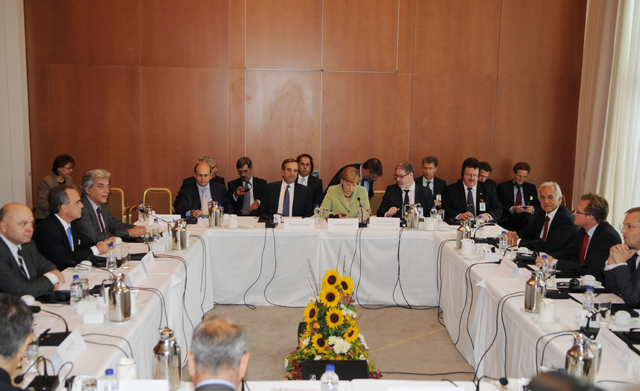Photo: To Vima, Ethnos
German Chancellor Angela Merkel met with twelve leading Greek businessmen who represent some of the strongest companies in Greece in key sectors such as finance, telecommunications, pharmaceuticals and energy. The meeting took place behind closed doors but according to government sources, it was extremely fruitful.
For one hour, Merkel took on the role of a moderator of the discussion. She gave each of the attendees  the floor to express in brief their viewpoints on what should be done to rescue the real economy. The common problem specified by the businessmen was the lack of liquidity in the market and the need for the aid tranche of 31.5 billion euro to be paid as soon as possible. The businessmen requested support for the investments to Greece and a reduction of interest rates, which are too high at present. According to those who attended the meeting, it was a high-level discussion. Merkel was cautious and did not make any specific promises. However, she advised the managers of Greek companies that if they wanted to attract more investments, they themselves first need to make additional investments to help their country.
the floor to express in brief their viewpoints on what should be done to rescue the real economy. The common problem specified by the businessmen was the lack of liquidity in the market and the need for the aid tranche of 31.5 billion euro to be paid as soon as possible. The businessmen requested support for the investments to Greece and a reduction of interest rates, which are too high at present. According to those who attended the meeting, it was a high-level discussion. Merkel was cautious and did not make any specific promises. However, she advised the managers of Greek companies that if they wanted to attract more investments, they themselves first need to make additional investments to help their country.
The head of the Hellenic Federation of Enterprises Dimitris Daskalopoulos told Angela Merkel that the severe austerity under the Memorandum of financial support has not brought the desired result. The country has fallen into the vicious circle of recession and the 600 thousand new unemployed in the private sector since the start of the programme have paid the price of the policy pursued. According to Naftemporiki, Daskolopoulos emphasized that the Memorandum of financial support has failed in economic and political terms and proved disastrous for the production activities in the country. "Modern Greek business fights the crisis, trying to preserve the jobs by investing its own capital in order to save the companies and pays taxes."
The head of the Hellenic Association of Pharmaceutical Companies Nikos Frouzis presented the problem of this segment which is the large outstanding amounts due by the state for supplies to the National Organization for Health Care Provision. He said that the first priority was the payment of the next tranche of financial aid from which the pharmaceutical companies should be paid some of the amounts due. Moreover, Frouzis requested the creation of conditions for investment in research and the opening of new jobs.
Pharmaceutical companies expect to receive from the next tranche about two billion euro in deferred payments. The reduction of the nominal value of Greek government bonds has affected them too and they insist on the establishment of a support fund similar to that of banks to compensate their losses from the PSI.
The voice of the president and CEO of the national telecommunications company OTE Michalis Tsamaz was also heard. According to him, one of the most serious problems for the company installing high-speed networks remains the restrictions imposed by the regulator to the National Telecommunications Commission. Deutsche Telekom has held 40% of OTE since 1997 and this is considered one of the most successful privatizations in Greece. The company's management emphasized before Chancellor Merkel the significant efforts made in Greece in recent years. Tsamaz stressed that the results of these efforts were concentrated on the structural and financial reform of the country to a level, which seemed unattainable two years ago.
The general message of the businessmen was that Greece has been making serious efforts to change the course of the economy and it is time for Europe to lend a more helping hand in stimulating the economic growth. The entrepreneurs stressed that a further decrease in the price of labour would not help the competitiveness of the local economy, but it would additionally harm the internal market. Angela Merkel, in turn, said that this was a topic that should be presented mainly to the supervisory Troika of the European Commission, the European Central Bank and the International Monetary Fund. In other words, she made it clear that she would not take a position on that matter and the ball has remained in the field of talks between the government and the lenders.
The meeting with Angela Merkel involved Michalis Mailis - chairman of the Greek-German Chamber of Commerce and Industry, Dimitris Daskalopoulos from the Hellenic Federation of Enterprises, Dimitris Kopelouzos - Promiteas-GAS S.A., Kostadinos Frouzis - Hellenic Association of Pharmaceutical Companies, Joachim Kohling from Hochtief, Nikolaos Nanopoulos from Eurobank, Michalis Tsamaz (OTE), George Zanyas from the National Bank of Greece, Stelios Zavos from Zeus Capital Partners, Arthouros Zervos (DEI), Byron Vargas Herzberg (Bosch-Siemens-Haus-haltsgerate) and Panos Xinis (Siemens Hellas).